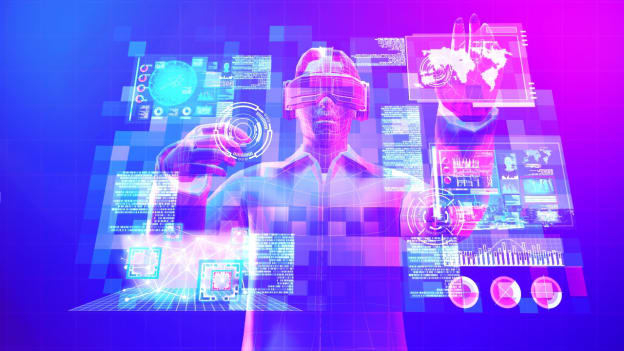Reimagining skilling through the metaverse

Over the last many years, technology-driven environments including social networks, video conferencing, 3D, AR/VR, and virtual games have enabled digital transformations for educators, businesses and individuals. The term “Metaverse” was coined to facilitate the digital transformation further in every aspect of our lives.
Gartner defines a “Metaverse” as a collective virtual shared space created by converging virtually enhanced physical and digital reality. It is persistent, providing enhanced immersive experiences, as well as device-independent, and accessible through any type of device, from tablets to head-mounted displays. Metaverse comprises various building blocks such as - Augmented reality (AR), Virtual reality (VR), Mixed reality (MR), Artificial intelligence (AI), Non-fungible tokens (NFT), Blockchain services, 3D modelling, Game design and development with multiple service layers under each of these blocks.
The metaverse offers endless possibilities to reimagine skilling in India. Poor infrastructure has always been a roadblock to the implementation of skilling programs in the country. A virtual space provides a solution with endless potential to scale. The adoption of technology and especially combining the power of AI, AR and VR – the metaverse has enabled many EdTech companies to shift from traditional learning to leveraging technology, for either conventional education, upskilling, reskilling or new skilling.
By eliminating the need for physical spaces, skilling programmes can be conducted from anywhere and for anyone. In theory, the metaverse provides greater access to Tier-2 and Tier-3 cities. By eliminating the need for travel, prospective students can be skilled through AR and VR, thereby creating a larger pool of resources across the country.
India is expected to have 1 billion smartphone users by the end of 2026, and the metaverse skilling revolution will go hand in hand with this growth. Metaverse technology can be extremely useful to provide life-like learning experiences building components, some of which are foundational to the metaverse, including Augmented Reality (AR), Virtual Reality (VR) and Artificial Intelligence (AI).
Many industries are exploring substituting conventional in-person learning with digital, VR-based learning alternatives. Instead of getting employees to travel to offices/learning centres, metaverse-like spaces can be used to skill virtually. Retail industries are mulling over using metaverse to upskill and reskill their distributed workforce, which can be real-time, virtual with store walk-throughs and interactive.
Engineering companies can use the metaverse to skill in trades such as plumbing, electrical, machine operations etc. using AR to create virtual, life-like and simulation-based learning experiences. Employees can be given real-time case studies to be resolved as well. Metaverse technology can also be used in the healthcare industry, especially training on ones that support high-risk surgeries, nursing training and much more.
The great resignation trend of 2021 has shown that people are now looking for flexible work and learning options. Traditional workspaces are slowly becoming obsolete as we enter into this unprecedented era of the knowledge economy. However, the shift from a labour-intensive economy to a knowledge economy requires upskilling, unlike anything we have seen in the past.
The metaverse offers a unique opportunity for gig workers to transform themselves by picking and choosing the particular skill set they are interested in. Moreover, the metaverse offers on-the-go skilling options that gig workers require. Studies have shown the current and next generation of workers are likely to prefer working from home and the metaverse is the perfect solution for L&D teams.
Concepts such as virtual and augmented reality are known in the gaming industry. However, these concepts have also become common in the skilling space.
L&D teams are increasingly using Game-Based Learning to provide immersive and engaging experiences to learners and AR and VR have become the crux. Knowledge retention through practical learning becomes a reality through the metaverse. For example, learners can now look at a 3D map of a machine and understand the concepts that are applied to the machine in real life.
The future of learning is likely to look very different from what the industry had expected two years ago. The pandemic caused a sea change in the workplace and skilling is no exception. While we may not know exactly what the future holds, the prospect of the metaverse is exciting.
This article was first published in October 2022.
















